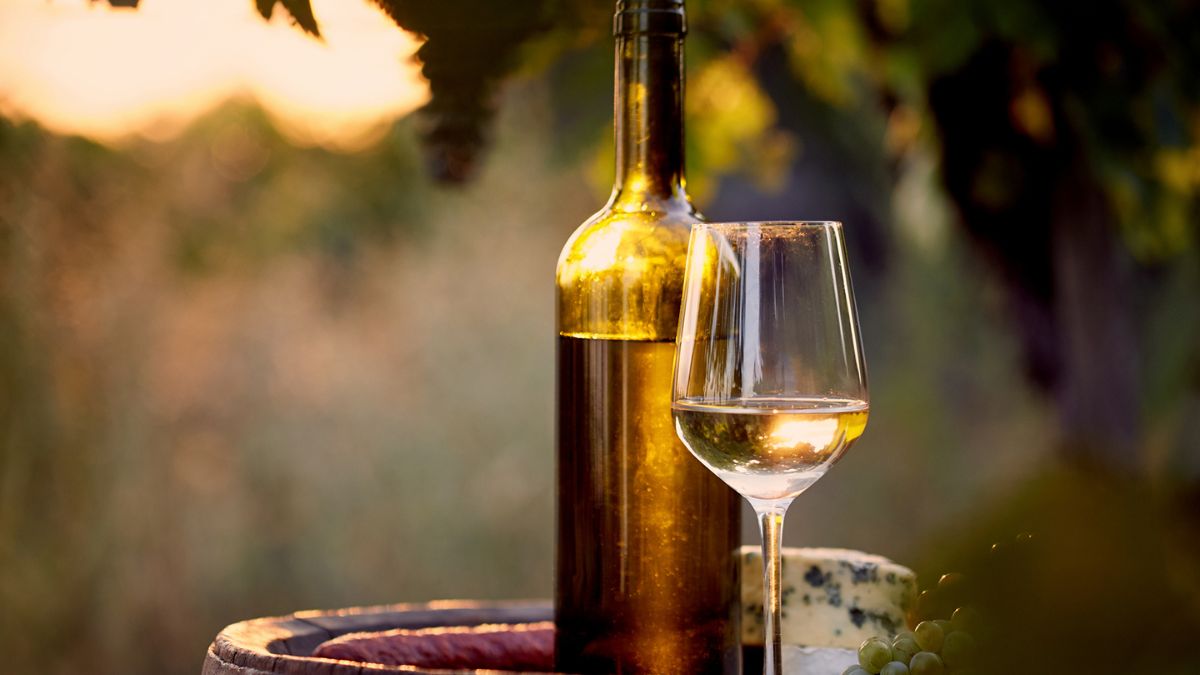Wine can be called “organic” if made from 100% organic grapes grown without synthetic chemicals in the vineyards. Also, making the wine must only use a small number of certified sulfites and organic products used in winemaking.
On the label of organic wine, there is a mark called the “Community logo,” which certifies the whole process of making the wine. Since 1991, our Pizzolato Winery has made it a point to ensure that our organic and vegan wines are as real and natural as possible. The goal is to make a wine that doesn’t always need sulfites because it’s a healthier wine with all the good things it needs to stay on its own.
What is Organic Wine?
Organic wine is wine made according to the standards of organic agriculture. This means that vintners follow a fairly strict regimen for all winemaking steps, from growing grapes to fermentation. The specific qualifications for organic wine vary by country.
United States: The US Department of Agriculture (USDA) rules organic certification for organic food and drinks in the US. The rules are then followed by inspectors not part of the company, and this rule applies to all organic farming in the United States. In viticulture, organic wine must be made from grapes grown without pesticides, fungicides, or herbicides made from chemicals. There are also strict rules about the additives and preservatives, like sulfites and the yeast used to turn grape juice into wine in the United States.
United Kingdom: In the UK, organic wine certification means that the grapes used to make the wine must come from organic farms. Other parts of fermentation and storage aren’t regulated.
Other regions: Standards are about the same in other parts of the world where wine is made, such as continental Europe, South Africa, Australia, and South American countries. Regarding sulfite levels, most countries are less strict than the US. But many international winemakers choose to make their wines according to the organic standards set by the USDA so that they can sell their wines to the large market of organic wine drinkers in the US.
What are Sulfites in Wine?
On a bottle of a wine label, you’ve probably seen the words “contains sulfites.” This is because sulfur dioxide (SO2) is there, which acts as a preservative. Sulfites not only keep the wine from going bad, but they also keep its flavor and texture.
Sulfur dioxide is a natural byproduct of fermentation, so all wines have some sulfites in them (white wines, especially sweet whites, tend to contain more, whereas dry red wines usually have the lowest levels). But sulfites are often added to traditional wines to help them last longer. Conventional wines can have up to 350 parts per million (ppm), but organic wines can only have 20 ppm. About 125 ppm is the average for all wines.
Biodynamic Wine vs. Natural Wine vs. Organic Win
Biodynamic wine, organic wine, and natural wine are all different types of wine, but there are a lot of similarities between them.
1. Natural wine: Natural wine is a broad category of wines made with as few changes as possible. It is also called raw wine or low-intervention wine. Natural wines are made from grapes grown in an organic or even biodynamic way, with no pesticides or herbicides. Natural wines use yeast that grows naturally, and winemakers don’t add many or any additives or preservatives like sulfites to the fermenting grape juice before bottling and aging it. Also, unlike conventional wines, natural wines are not filtered or fined.
2. Organic wine: This type of wine must follow the official USDA-certified organic farming rules, which say how it should be grown, fermented, bottled, and stored. The grapes must be grown organically, with native yeasts, no genetically modified organisms (GMOs), and no sulfites other than those that naturally occur.
3. Biodynamic wine: Many biodynamic farming practices are the same as organic farming, such as limiting synthetic fertilizers and pest control. But biodynamic grape growing goes even further by emphasizing biodiversity and a healthy ecosystem. Biodynamic farmers use a specific set of fertilizers, and their farming methods are based on the astrological calendar.
Why Choose an Organic Wine?
Organic wine is a wine that is made with nothing but natural ingredients. No chemicals are used at any point in the process. Vineyards are grown in their natural environment, where herbs grow on their own, and there are a lot of biodiversities. The plant can make well-balanced fruits that show the typical traits of the growing area. Organic wine is healthy, natural, and real. It doesn’t contain any chemicals, so it’s good for the environment and the health of the people who drink it, as well as the health of the people who make it and the people around them.
Why does Organic Wine have a Higher Price?
Many problems come up when growing an organic vine. These problems keep coming up every day, especially when we have a bad harvest and need to protect the crop but don’t want to use any chemicals. This, however, always pushes us to get better and make the most of each harvest to offer a 100% organic, healthy wine. We can try out new products because of our current technology and agronomists’ experience.
Copper is the best way to fight naturally occurring diseases that can affect vines, as long as you don’t break the law. The vine can handle this natural part pretty well, but it’s still a product spread through the soil, so our research focuses on finding alternatives and testing resistant vineyards.
Organic wine is more expensive for consumers, but the higher price should be seen as a guarantee of a natural, eco-friendly product and as a reason for the higher costs that companies have to pay to give consumers a great organic wine with all of the above qualities.
The Trend of Organic Wine in Italy
The organic wine market in Italy is booming. This is not just because the number of companies making organic wine is growing but also because the market demand is increasing. People are becoming more aware of what they eat and drink and how it affects the environment and ecosystem. In the past few years, the number of organic vineyards and those in the process of becoming organic has grown significantly, and this is likely to continue for a long time.
Most wineries decided to sell their wine through large organized distribution channels because more and more people want to buy organic products. Organic wine is now easy to find in supermarkets, so you don’t have to go to a specialty store or buy it directly from the maker.
The Trend of Organic Wine Abroad
The market for organic wine overseas has grown to a point where it is important enough for many Italian wineries, which are increasingly looking to sell their wines abroad, to be interested. We mostly sell our sparkling Prosecco doc extra dry in Scandinavian countries like Norway and Sweden, where we have a monopoly on the market.
Germany was the first market to accept us, which started in the late 1980s when the organic movement started. The USA wants more and more of our NSA wine: Prosecco with no added sulfites, Merlot, Rosso Convento, and Cabernet with no added sulfites, all certified by the USDA, as well as our Organic Moscato and Pinot Grigio, which are certified wines.
Do Organic Grapes Make Organic Wine?
Pesticides, fertilizers, and herbicides that are bad for you are not used on organic grapes. Because of this, organic wine is a more natural and healthier thing to drink. When winemakers spray pesticides and herbicides on grapes and vines, they are trying to get rid of any weeds or insects that are bothering the vines.
Unfortunately, these sprays can leave behind chemicals that can end up in your wine, the soil around it, and rivers. There is a certified organic wine, wine made with organic grapes, and wine made with organic grapes, but not according to the National Organic Program, which the federal government requires. There is also biodynamic wine, wine made with biodynamically grown grapes but not according to biodynamic standards, and wine made sustainably.
Is Drinking Organic Wine Better for you?
Organic wine is known to give you less of a headache. This is because it doesn’t have any chemical additives like regular wine. Instead, it’s just pure grape juice that goes into your body. On the other hand, regular wine has up to 70 extra ingredients added, such as sulfur dioxide, preservatives, dyes, and sugar. So, while red wine is known for its health benefits, organic wine trumps it healthwise every time Because the resveratrol levels that classic red wines contain (which makes them so good for you) are 80 percent lower than the levels of resveratrol that are found in organic wines.
And Why is Resveratrol so Good for us?
- It helps to lower cholesterol.
- It helps reverse arterial damage.
- It is a known anti-inflammatory agent.
- It has even been found to cause apoptosis in cancer cells ( it makes them commit suicide)
Here are three more great reasons that should do the trick.
3 Reasons Why Organic Wine is Better than Standard Wine
It’s Produced Without the Addition of Any Chemicals at Any Production Stage. No artificial chemicals, no synthetic chemicals, no herbicides, no pesticides. Instead, wine growers work with nature to boost the biodiversity of their vineyards.
It contains just half the sulfur dioxide that classic wines contain. Sulfur dioxide is a preservative often added to wine to keep bacteria from living in the wine or bottle. Oh, and it’s also one of the main reasons you get a stinky hangover after a day of drinking.
It simply tastes better. As with organic meat, fruit, and vegetables, there is no doubt that the flavors in organic wines are stronger, more complex, and much purer than those in other wines.
Lastly, if you need more proof that organic wine is better for you, consider this: you can skip your morning glass of orange juice in favor of your second glass of organic wine in the evening because organic wine has the vitamin C you need. I’m glad to help.
Conclusion
Organic wine is not much different from regular wine in terms of how much alcohol it has and how it tastes, smells, or feels in your mouth. But organic wine doesn’t last as long because it doesn’t have as many sulfites added. Compared to wines that aren’t made with organic ingredients, organic wines may go bad sooner.
Organic vineyards can grow any grape, even well-known ones like cabernet sauvignon and pinot noir. In the same way, organic wine production can include any wine, from flat reds like merlot to sparkling whites like chardonnay to bright rosés. Any wine can qualify as long as the grapes are grown organically and no sulfites are added during processing.
https://youtu.be/GTPGrqfPaXQ


